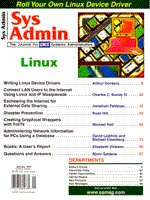
Listing 1: Excerpt from include file
* int (*open)(struct tty_struct * tty, struct file * filp); * * This routine is called when a particular tty device is opened. * This routine is mandatory; if this routine is not filled in, * the attempted open will fail with ENODEV. * * void (*close)(struct tty_struct * tty, struct file * filp); * * This routine is called when a particular tty device is closed. * * int (*write)(struct tty_struct * tty, int from_user, * const unsigned char *buf, int count); * * This routine is called by the kernel to write a series of * characters to the tty device. The characters may come from * user space or kernel space. This routine will return the * number of characters actually accepted for writing. This * routine is mandatory. * * void (*put_char)(struct tty_struct *tty, unsigned char ch); * * This routine is called by the kernel to write a single * character to the tty device. If the kernel uses this routine, * it must call the flush_chars() routine (if defined) when it is * done stuffing characters into the driver. If there is no room * in the queue, the character is ignored. * * void (*flush_chars)(struct tty_struct *tty); * * This routine is called by the kernel after it has written a * series of characters to the tty device using put_char(). * * int (*write_room)(struct tty_struct *tty); * * This routine returns the numbers of characters the tty driver * will accept for queuing to be written. This number is subject * to change as output buffers get emptied, or if the output flow * control is acted. * * int (*ioctl)(struct tty_struct *tty, struct file * file, * unsigned int cmd, unsigned long arg); * * This routine allows the tty driver to implement * device-specific ioctl's. If the ioctl number passed in cmd * is not recognized by the driver, it should return ENOIOCTLCMD. * * void (*set_termios)(struct tty_struct *tty, struct termios * old); * * This routine allows the tty driver to be notified when * device's termios settings have changed. Note that a * well-designed tty driver should be prepared to accept the case * where old == NULL, and try to do something rational. * * void (*set_ldisc)(struct tty_struct *tty); * * This routine allows the tty driver to be notified when the * device's termios settings have changed. * * void (*throttle)(struct tty_struct * tty); * * This routine notifies the tty driver that input buffers for * the line discipline are close to full, and it should somehow * signal that no more characters should be sent to the tty. * * void (*unthrottle)(struct tty_struct * tty); * * This routine notifies the tty drivers that it should signal * that characters can now be sent to the tty without fear of * overrunning the input buffers of the line disciplines. * * void (*stop)(struct tty_struct *tty); * * This routine notifies the tty driver that it should stop * outputting characters to the tty device. * * void (*start)(struct tty_struct *tty); * * This routine notifies the tty driver that it resume sending * characters to the tty device. * * void (*hangup)(struct tty_struct *tty); * * This routine notifies the tty driver that it should hangup the * tty device. *
|